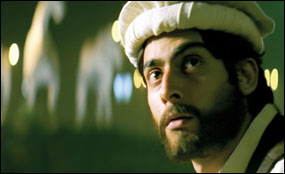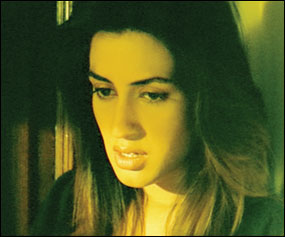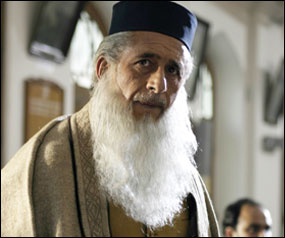|
|
| |
instep
comment
Khuda kay liye
– more than just a film?
As ideologies clash on our television screens, it seems that Khuda
Kay Liye
has become even more pertinent...
By
Sonya Rehman
|
| |
It
is ironic. While Khuda Kay Liye (a film which endeavours at highlighting
an empathetic facet concerning Muslims post 9/11), gets ready to make
its debut within the archaic walls of local cinemas, the walls of
the 'Red Mosque' ('Lal Masjid') are being pierced with bullets. But
hopefully by the time you read this, there would've been a conclusive
end to the entire fiasco that's been an ongoing mêlée
for the past five days in the capital now.
However, back to the paradox of the current circumstances; where Shoaib
Mansoor's debut film aims at rectifying 'contemporary' Islam's image,
Maulana Abdul Aziz and Abdur Rashid Ghazi have hoisted the banners
of Jihad high – that too behind their protective red fortress
– reinforcing the eyes of the West to stare at Pakistan with
a gleam of 'hah we knew it, bloody fundamentalist militants' in their
eyes.
Added to the irrationality of the situation, Maulana Abdul Aziz's
extraordinary act of bravado will be remembered for years to come
regarding his 'meticulous' getaway plans of sneaking out - enveloped
in a burqa from head-to-toe, close at the heels of his wife! Thorough
champ you are, sir. |
 |
| |
To
label these times as strange, albeit insecure, would be understating
a situation that has begun to spread its nightmarish black wings over
the country's horizon. And what is awaited upon now, is a sort of
'settlement' - the ironing out of creases that have seemed to lodge
themselves deep within Pakistan's sun-beaten, weary forehead.
"It truly is a war between the moderates and the fundamentalists",
many would acknowledge - just as Shoaib Mansoor has, in his official
statement (up on the movie's website). But it runs deeper. Far deeper.
Because as the rivers of cultural schism run deep and strong, the
liberals, fundos (and the in-betweens) play out their parts like pawns
on a large chess board labeled 'global politics'. |
| |
Nudged
and prodded to progress towards their opponents by means of hurling
bombs, verbal grenades, heavy shells of threats, and the likes, there
seems to be much at stake within the country – in addition to
the ongoing bedlam of an up in arms judiciary regarding the CJP's
riddance and later, replacement.
But the vicious cycle is slowly chugging its way to a final stop.
It's in the air. You can almost smell it. When it will happen…
who really knows, but 'change' (whether positive or negative) has
begun to smell as seasoned and as ripe as a mango just waiting to
be plucked. |
 |
| |
For
years, filmmakers have produced works revolving around a country's
politics, history and social make-up. Walk into any movie store or
browse lists of films online – and you will see that the options/genres/categories
are copious.
From movies such as Roots (on black slavery), The Gangs of New York
(the riots in 1863 between Irish immigrants and Native Americans),
Anna and the King (on Thailand during the American Civil War), Gandhi,
Dr. Zhivago (the Russian Revolution), Apocalypse Now, Saving Private
Ryan, Jinnah, Passion of the Christ, Seven Years in Tibet, Earth and
countless others. Each bespeaks of a war, an era, a religion and human
strife – whether emotional or physical. |
 |
| |
And
if one looks at the numerous films made on the holocaust that have
abetted in keeping the memory of the horrors that took place at Auschwitz
alive, and those tailored around the backdrop of partition (of India
and Pakistan), one would realize that films have been and still very
much are, the greatest sources of historical, political and social
commentary in the world.
So will Khuda Kay Liye (In the Name of God) prove to be more than
just a film which revives Pakistani cinema? Will it aid in reforming
the 'Muslim image' as perceived by the West? Or would it perhaps assist
in creating an additional gash in the country's ever-widening cultural
schism between liberals and fundamentalists? |
 |
| |
Will
the film rise up to the hype that surrounds it, or won't it? It is
yet to be ascertained.
But going by Shoaib Mansoor's 'Director's Statement' (on the film's
webpage), where he affirms that it was his "duty to rectify the
damage he [Junaid Jamshed] had done to the already suffering society
under the influence of fundamentalists," the chances of Khuda
Kay Liye being a revolutionary feature film, are estimated to be pretty
high. Can anything be more exciting than having a real life clash
of ideologies playing out on reel?
|
|

